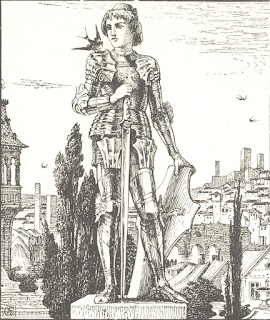The Happy Prince, Statues and Fallen Idols
I recently went to see Rupert Everett's wonderful film, The Happy Prince, about the last days of Oscar Wilde. The story is framed by Wilde telling his fairy tale, The Happy Prince, both in his lost past with his sons, and his down-at-heel present with young denizens of the Parisian demi-monde.
I have loved The Happy Prince since childhood but hadn't thought to associate it with Wilde's life until now. In the film, there is a clear parallel between the statue of the Prince being stripped of his gold and jewels until he is finally torn down as an eyesore by the Mayor, and Wilde's fall from his heady period of fame, through scandal and prison, towards derision, destitution and death.
This led me to think about our own times, which have seen a large number of high-profile celebrities and "national treasures" brought down through scandal and court cases. Some of these individuals have committed genuinely terrible crimes, unlike Oscar Wilde, who was a victim to the attitudes of his time (including his own). Yet, before their downfall, they were well-loved and respected public figures, the recipients of honours and awards. They seemed as generous with their gold as The Happy Prince. People put them on a pedestal, figuratively if not literally.
Which brings me back to the question of statues. It's been a hot topic recently, with campaigns such as "Rhodes Must Fall" demanding that various statues be torn down because of the subject's sullied reputation. Cecil Rhodes, for example, was held in honour in Oxford because of his generous donations to the university. But his money came from colonial exploitation in Southern Africa (he even named a conquered territory Rhodesia, after himself). At the time, he and his contemporaries probably never imagined that students from Southern Africa would one day come to study at Oxford, or question what their attitude would be to seeing a statue of Rhodes. (The Rhodes Must Fall campaign actually started at the University of Cape Town in South Africa, where Rhodes' statue was seen as a symbol of colonial oppression, and was successfully removed).
It can be hard to come to terms with "fallen idols". One reason for this is that people find it hard to accept that there is both good and bad in a person. Sometimes, extremes of both. I used to find the Second Commandment (You shall make no graven images) somewhat irrelevant to modern culture. But since statues have spent so much time in the news, I have started to see what the point of such a commandment might be. None of us are perfect, which makes it risky to put anyone on a pedestal. They will almost always fall.
In the fairy tale, The Happy Prince becomes a better person as a statue than he was in life, even though it leads to him becoming faded and forgotten. Did Oscar Wilde become a better person after his fall? I don't know. But hitting rock bottom always provides the opportunity for repentance, restitution and redemption.





Comments
Post a Comment